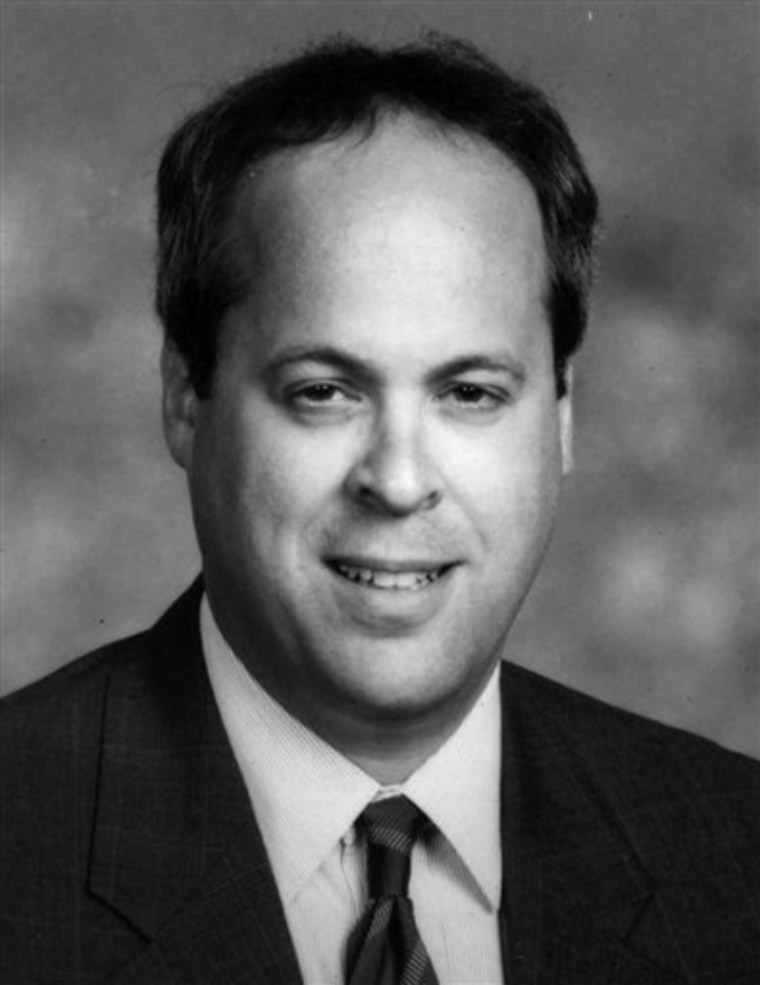Glenn Winuk was found in the ashes of the World Trade Center with surgical gloves on his hands and a medic's bag at his side. A card in his wallet identified him as a volunteer firefighter.
The discovery confirmed what friends already knew. As the towers burned, the 40-year-old lawyer had rushed from his nearby office to offer help as a veteran EMT.
"He died a hero," said his brother, Jay.
Yet, in the eyes of the federal government, he did not die in the line of duty.
In a decision sent to Winuk's parents days before the fifth anniversary of his death, the Justice Department rejected their application for a $250,000 benefit for public safety officers killed on the job.
Its reasoning was apologetically bureaucratic; while Winuk was an associate member of the Jericho Fire Department on Long Island, he hadn't been on active duty since 1998.
"I recognize the decedent's heroism that day and readily acknowledge and salute his bravery: Glenn J. Winuk gave unstintingly of himself, under the most dreadful circumstances, and gave unto death itself," wrote Domingo S. Herraiz, director of the Bureau of Justice Assistance.
"The law does not entrust me, however, with authority to distribute federal benefits in recognition of the ultimate sacrifice paid by good Samaritans, no matter how deserving," he added.
Disputes arise regularly
The denial is one of several difficult rulings the bureau has made while administering the Public Safety Officers' Benefits Act, a 30-year-old program that provides a one-time payment to the families of slain police, firefighters and government rescue workers.
Since the program's inception, disputes have arisen regularly about deaths due to medical conditions, self-inflicted gunshots or auto wrecks.
There has been debate, too, over precisely who counts as a public safety officer.
In July, a federal judge overturned a decision to deny benefits to a civilian pilot killed battling a wildfire near Hopland, Calif. Although the program excludes contractors, the court said the aviator qualified because of his actions for the state's Department of Forestry and Fire Protection.
In March, a judge said the benefit was wrongly withheld from a 14-year-old junior firefighter hit by a car while answering an alarm on his bicycle. Christopher Kangas of Brookhaven, Pa., was a volunteer apprentice whose duties were limited to drills and firehouse chores.
Jay Winuk said his family also plans to appeal the ruling on his brother, who was on active duty for 19 years before switching to associate status.
"It just adds salt to a wound that's about the biggest wound you could have," he said. "It's like they're trying to find every which way not to honor this guy."
An even thornier decision may lie ahead — whether payments should go to rescue workers who inhaled trade center dust and were later diagnosed with fatal lung ailments.
An attorney for the family of New York police detective James Zadroga, who died in January, said Thursday that he plans to seek a payment under the program. Doctors blamed the 34-year-old's fatal lung problems on his work at ground zero.
"This guy deserves it," said attorney Michael Barasch. "He is no different than a cop who got shot in the chest, lingers for a year and then dies."
The Public Safety Officers' Benefits Act prohibits claims for long-term, job-related illness, but guidelines published this year said payments can be made if a death is directly caused by exposure to chemicals while on duty.
The Justice Department said it has so far paid 435 claims following the terror assault, almost all to full-time police and firefighters. That is nearly double the claims usually paid annually.
The department did not respond to repeated requests for information about how many Sept. 11 claims it denied.
A Justice Department spokeswoman said that, on average, about 10 percent of those who apply each year are ineligible.
After the attacks, Congress passed legislation speeding payments to terrorism victims. It also expanded the program to cover fire and police chaplains.
Officials lobby for claim
The denial of Winuk's claim came despite lobbying by high-profile officials, including former New York Fire Commissioner Thomas Von Essen, commander of the department on Sept. 11.
"I can assure you that true firemen don't care about their 'membership status' when life is at stake, and every indication is that Glenn Winuk was a true fireman," Von Essen wrote in a letter to the Justice Department.
New York's legislature passed a law, signed by Gov. George Pataki last year, declaring that Winuk died in the line of duty. A Justice Department hearing officer also concluded he should receive the benefit, but his recommendation was overruled.
U.S. Rep. Peter King, a Long Island Republican, urged the department to reconsider.
"How or why you would deny this person is beyond me," he said. "To me, if there is any ambiguity ... you give the benefit of the doubt to the rescue worker."
